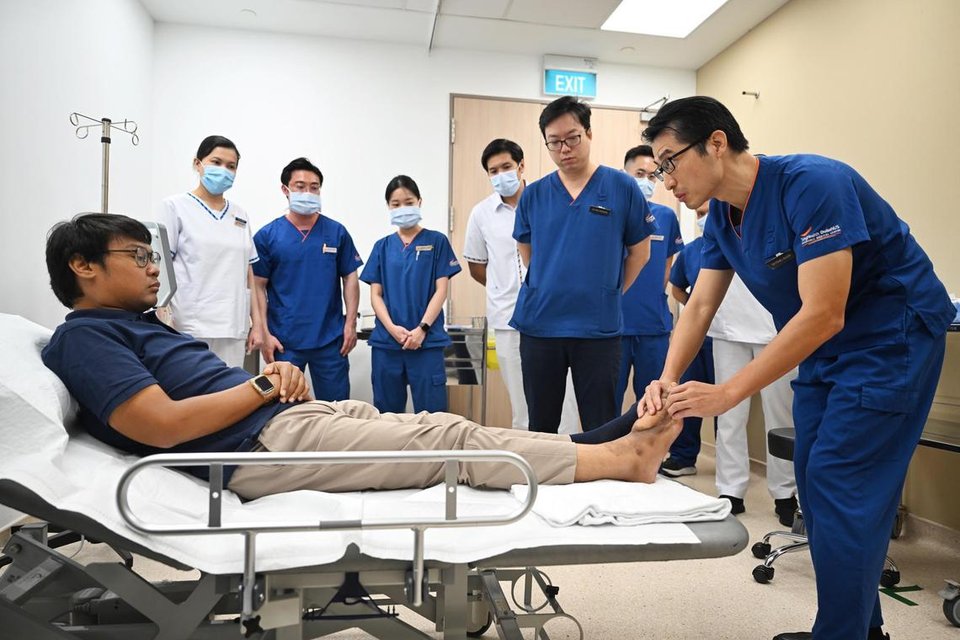Group activities can lower prevalence of dementia, depression among seniors: Study

Published on
03 May 2023
Published by
The Straits Times
SINGAPORE – A 10-year study on dementia prevention that spawned a community programme found that the dementia prevalence rate rose less than expected while the prevalence of depression fell.
In 2011, when the Jurong Ageing Study started, nearly 2 per cent of the cohort of 1,107 seniors had dementia and 7.3 per cent had depression.
After five years, researchers found that those who participated in group activities, such as art, music and horticultural therapy, mindfulness practice as well as health education, had better overall mood and cognition.
The prevalence rate for dementia rose by just 1 percentage point to 3 per cent, which was lower than the 6 per cent it was expected to be, based on the overall trend here, said Professor Kua Ee Heok, vice-chair of the Mind Science Centre and the study’s lead investigator.
He shared some of the study data, which was published in a journal last year, at the National University of Singapore (NUS) psychiatry symposium on ageing in place last Thursday.
The 3 per cent rate stands in contrast to the prevalence in the national population, added Prof Kua, who is also the Tan Geok Yin professor in psychiatry and neuroscience at NUS.
An estimated one in 10 people here aged 60 and above has some form of dementia, a syndrome that causes the progressive deterioration of brain function.
There is also evidence that a proportion of dementia cases is linked to conditions such as diabetes and obesity.
At the same time, the prevalence rate for depression dropped to 5 per cent, which was a welcome reversal as depression can lead to suicide, Prof Kua said.
“Suicide is still quite high among the elderly people in Singapore. If you can tackle depression, you can bring down the suicide rate,” he told The Straits Times.
The Jurong Ageing Study gave rise to a community programme in dementia prevention. Now known as the Age Well Everyday (AWE) programme, it is available at 10 centres around the country, with 13 volunteers at the Marymount Community Club being the latest group to be trained to conduct it.
Prof Kua said only the five-year outcome of the 10-year study was captured due to a lack of funds, but it showed that a structured community programme can help to prevent or delay the onset of dementia.
“It’s an inexpensive, non-drug approach,” said Prof Kua, who will be sharing the findings at the World Congress of Psychiatry in Vienna, Austria, in September.
Not all cases of dementia can be prevented, but a reduction of the national prevalence rate from 10 per cent to 9 per cent would already benefit about 10,000 people, he noted.
An unexpected outcome of the study, said Prof Kua, was the social connectedness that arose among the participants. “This was especially so during the choir singing sessions when they got to know each other. We realised that the ‘young old’, between the ages of 65 and 74, began to care for the ‘old old’.”
The AWE programme is conducted by volunteers trained by the Mind Science Centre.
They are trained in health education, specifically diabetes and hypertension, physical activities and mental activities such as mindfulness therapy and music reminiscence, which involves listening to popular old songs and discussing past events and experiences with a therapist in the group.
At RSVP Singapore, the AWE programme is conducted by groups of volunteers in weekly sessions lasting 1½ hours each.
“The programme is so comprehensive... I must say a big thank you to all these volunteers. They have touched the lives of seniors through the sessions,” said 63-year-old Linda Thng, a recent participant.
She added that the participants got to try activities that improve well-being that they might otherwise not be aware of. “Some people will say that they listen only to Chinese music or that music is not for them. But they will realise that actually, music is going to keep their brain working, and they can make it a point to listen to more music,” she added.
While preventing dementia is not top of Ms Thng’s mind now, it is a condition she is familiar with. She helps care for her mother, who was diagnosed with the condition two years ago.
The programme, first piloted in late 2015, is flexible, and community partners can opt to vary some of the activities and adopt their own schedules.
Sustaining a pool of volunteers can be a challenge, with some centres having to stop during the pandemic. The Mind Science Centre switched to online training a few years ago to try to reach out to more volunteers, but the programme did not take off as hoped.
One successful programme is at the Kong Meng San Phor Kark See Monastery, which started a pilot run of AWE in July 2016 and has managed to secure enough volunteers to continue.
Its free, 12-week programme incorporates mindfulness practice, health education, exercise and music reminiscence.
Ms Tricia Lim, team lead of the monastery’s Joyous Heart senior department, said more than 50 people have signed up for the next run, which is yet to be scheduled. The current run – with 18 trained instructors and 16 companion volunteers – has not ended.
The companion volunteers have unique roles, she added. “They accompany senior participants to different stations, escort them to the washroom, to the dining hall for lunch, ensure participants’ safety, act as timekeepers for the instructors, and provide support for activities like horticulture.”
She said the programme is open to those aged 45 and above, and participants in the current run are aged between 53 and 90.
“Throughout the course, we encourage socialising among the seniors and promote the building of friendships. To strengthen these connections, we provide lunch for all participants after each session to create an inviting atmosphere for social interaction,” Ms Lim added.
Source: The Straits Times © SPH Media Limited. Reproduced with permission.
ALL views, content, information and/or materials expressed / presented by any third party apart from Council For Third Age, belong strictly to such third party. Any such third party views, content, information and/or materials provided herein are for convenience and/or general information purposes only. Council For Third Age shall not be responsible nor liable for any injury, loss or damage whatsoever arising directly or indirectly howsoever in connection with or as a result of any person accessing or acting on any such views, content, information and/or materials. Such third party views, content, information and/or materials do not imply and shall not be construed as a representation, warranty, endorsement and/or verification by Council For Third Age in respect of such views, content, information and/or materials.







